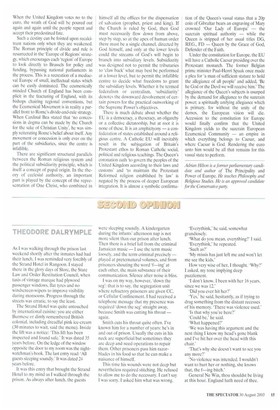:IL ] 1_LI _I
THEODORE DALRYMPLE
As I was walking through the prison last weekend shortly after the inmates had had their lunch, I was reminded very forcibly of the Strand Hotel in Rangoon. 1 stayed there in the glory: days of Slorc, the State Law and Order Restitution Council, when taxis of vintage marque had plywood passenger windows, flat tyres and no windscreen-wipers to improve visibility during monsoons. Progress through the streets was erratic, to say the least.
The Strand Hotel was quite untouched by international cuisine: you ate either Burmese or dimly remembered British colonial, including dreadful pink ice-cream (30 minutes to wait, said the menu). Inside the lift was a notice: 'This lift has been inspected and found safe.' It was dated 35 years before. On the ledge of the window opposite the door to my room was the nightwatchman's book. The last entry read: 'All guests sleeping soundly.' It was dated 24 years before.
It was this entry that brought the Strand Hotel to my mind as I walked through the prison. As always after lunch, the guests were sleeping soundly. A kindergarten during the infants' afternoon nap is not more silent than our prison after lunch. Then there is a brief lull from the criminal Jamaican music — I use the term music loosely, and the term criminal precisely — played at preternatural volumes, and from prisoners shouting the word 'f—ing' at each other, the main substance of their communication. Silence after noise is bliss.
I was on my way, however, 'down the seg': that is to say, the segregation unit where refractory prisoners are given CC, or Cellular Confinement. I had received a telephone message that my presence was required 'down the seg' straight away, because Smith was cutting his throat — again.
Smith cuts his throat quite often. I've known him for a number of years: he's in and out of prison. Usually the cuts in his neck are superficial but sometimes they are deep and need operations to repair them. Other prisoners pass him razorblades in his food so that he can make a nuisance of himself.
This time his wounds were not deep but nevertheless required stitching. He refused to allow me to do the necessary. I can't say I was sorry. I asked him what was wrong. `Everythink,' he said, somewhat grandiosely.
'What do you mean, everything?' I said. `Everythink,' he repeated.
'Such as?'
'My missis has just left me and won't let me see the kids.'
How very wise of her, I thought. 'Why?' I asked, my tone implying deep puzzlement.
'I don't know. I been with her 16 years, since we was 12.'
'Did you ever hit her?'
'Yes,' he said, hesitantly, as if trying to drag something from the distant recesses of his memory. 'There was violence used.'
'Is that why you're here?'
'Could be,' he said.
'What happened?'
'We was having this argument and the next thing I know my head's gone blank and I've hit her over the head with this chair.'
'That's why she doesn't want to see you any more?'
'No violence was intended. I wouldn't want to hurt her or nothing, she knows that, the f—ing bitch.'
General Ne Win, thou shouldst be living at this hour. England hath need of thee.


























































 Previous page
Previous page